DCS: A-10C Warthog is a PC simulation of the U.S. premier Close Air Support attack aircraft. This is the second aircraft in the DCS series, following DCS: Black Shark, and raises the bar even higher in the DCS series. Warthog brings the most realistic PC simulation of a modern fixed wing combat aircraft in regards to flight dynamics, avionics, sensors, and weapon systems. You also have the option to play Warthog in "Game" mode for a casual game experience. Fly missions in the Caucasus region of the Black Sea against and with a wide array of air, land and sea forces with new and improved intelligence. Create your own missions and campaigns with the included Mission and Campaign Editors, and fly with and against friends online using the included online game browser.
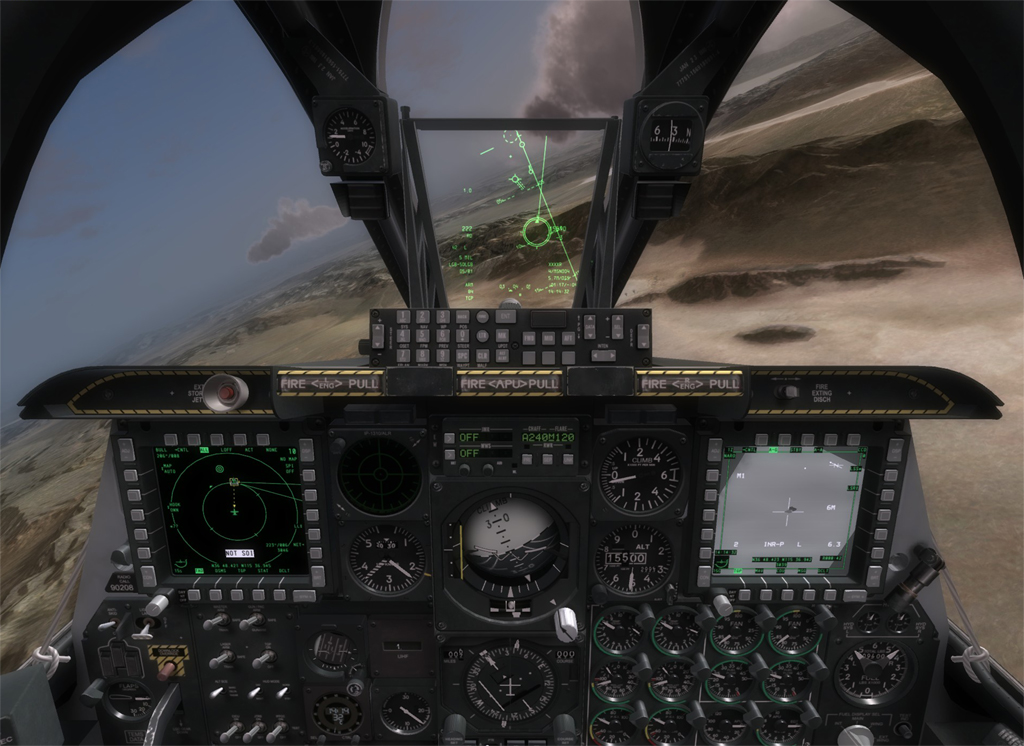

The A-10C is an enhanced version of the famous A-10A that served as a major close air support aircraft for the U.S. Air Force, Air National Guard, and Reserves for almost 30 years. A-10C has been upgraded to meet 21 st century standards, using systems such as Multi-Function Color Displays (MFCD), GPS-guided weapons, and data-link support. Retaining all the features of older A-10A, the A-10C has turned into a true precision strike fighter with the most modern navigation systems, precision attack weapons (Maverick, JDAM, WCMD, and laser-guided bombs), and an integrated countermeasures system.
The A-10C has participated in operations over Iraq and Afghanistan and proved to be a precise and effective weapon in the "War on Terrorism". Its advanced equipment has greatly reduced the number of "friendly fire" incidents - thanks largely to the Situational Awareness Datalink (SADL) and the ability to better identify targets with using the Litening II AT targeting pod.
The A-10C of course retains its ability to do what it was originally designed to do: kill tanks in a conventional force-on-force battlefield.Despite the fact that many of the computer and weapon systems are new in the A-10C, most of the remaining systems are retained from the A-10A. Engines, fuel, electrical, hydraulic and emergency systems, communications, and lighting do not differ from those in the latest versions of A-10A/A-10A+. As with previous versions, the A-10C - very easy to fly and is a stable and survivable weapons platform. For those familiar with DCS: Black Shark, we feel that the A-10C will be much easier to fly.
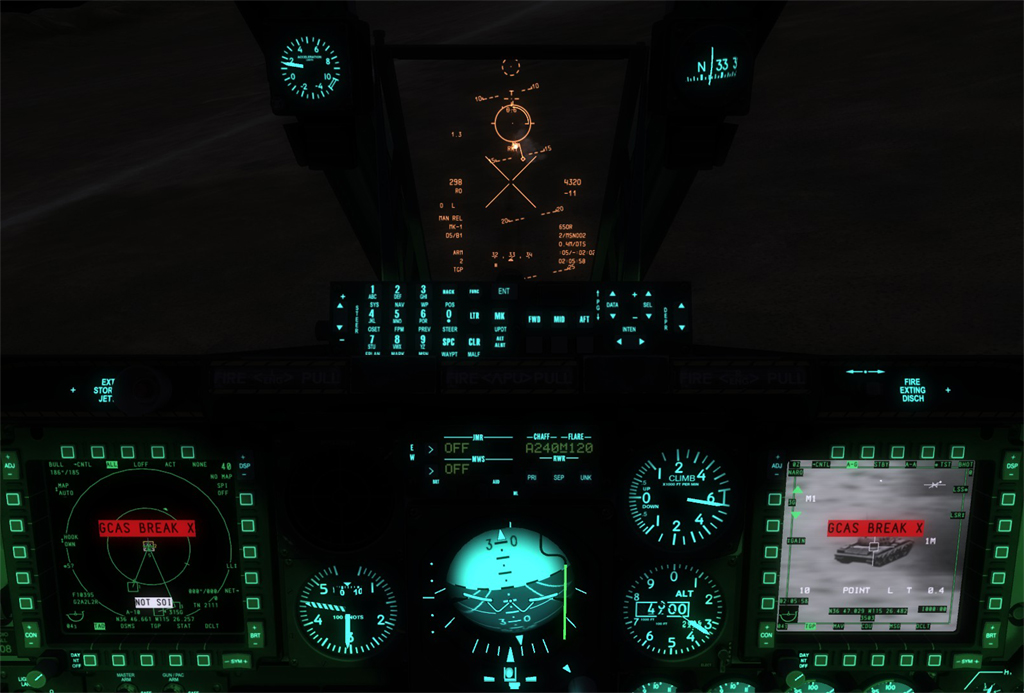
The DCS A-10C cockpit is a 100% six-degrees of freedom (6 DOF) cockpit that allows complete freedom of movement around the cockpit. Each panel is reproduced in exacting detail to match operational A-10Cs (Suite 3.1). This includes all panels, switches, dials, buttons being animated, rendered in the 3D, and with high-resolution textures. Both day, night, and Night Vision Goggle (NVG) lighting is available.
When the mouse is hovered over a cockpit control, a tool tip is displayed to indicate the controls function.
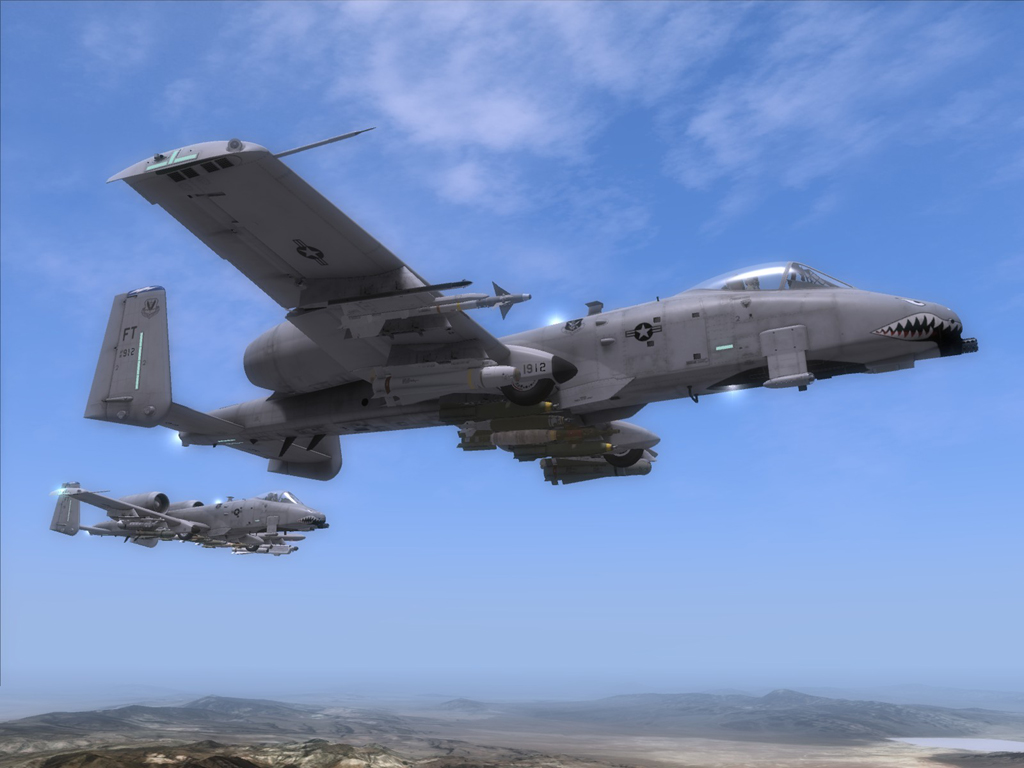
As with the cockpit, the 3D model of the A-10C is highly detailed with complete animation of control surfaces, multiple-texture maps, normal and specular maps, and 100,000 polygon construction.
Several USAF A-10C active duty, Air National Guard, and Reserve unit squadrons are included with accurate markings.
The A-10C model has an integrated, highly-detailed damage model that can range from a few bullet holes to entire sections of the aircraft being blown off.
The front dash of the A-10C sports two MFCDs that can display data from various aircraft sub-systems (DTS, TAD, DSMS, TGP, MSG, STAT, and video from Maverick missiles). They allow a much more rapid and intuitive way to convey to the pilot the necessary information and input data. Each MFCD is 5x5 inches (12.7h 12.7w cm) and has 5 buttons on each of the 4 sides. The functions of these Option Select Buttons (OSB) depend on the context of the selected MFCD page.
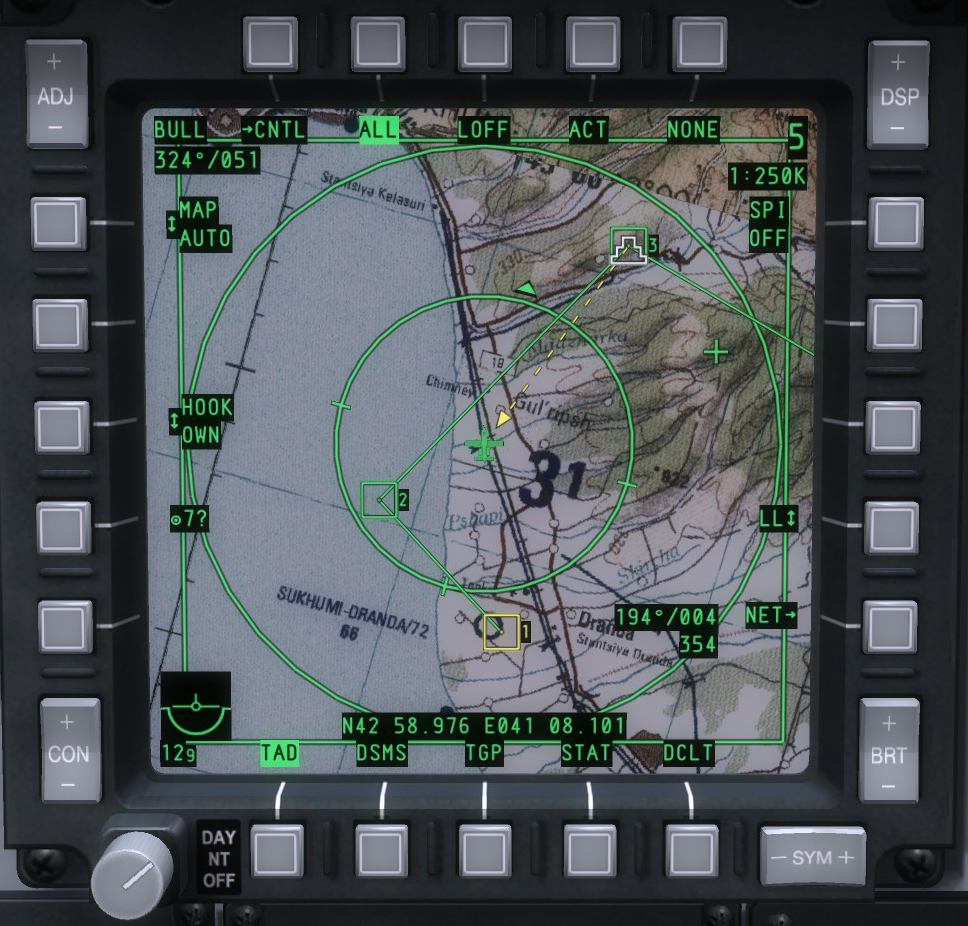
The TAD displays a top view of the current tactical situation using symbols that represent your current position (Ownship), mission anchor point (Bullseye), Sensor Point of Interest (SPI), waypoints, flight route, and datalink symbols of friendly air and ground units. The TAD may be set as the Sensor Of Interest (SOI) that allows the TAD to be interacted with including using the slew control on the HOTAS throttle to slew the TAD cursor. Other functions are also controlled by the HOTAS. Using the TAD cursor, you can designate (hook) symbols on the TAD and set them as your SPI and get additional information about them.
All of this data can be overlaid on real air navigation charts of various types depending on the TAD display scale (ONC, TPC, JOG, etc.). Map will be available for both the Black Sea and Nevada theaters.
When receiving a digital 9-line briefing from a Joint Terminal Attack Controller, the assigned target is marked on the TAD for easy target locating.
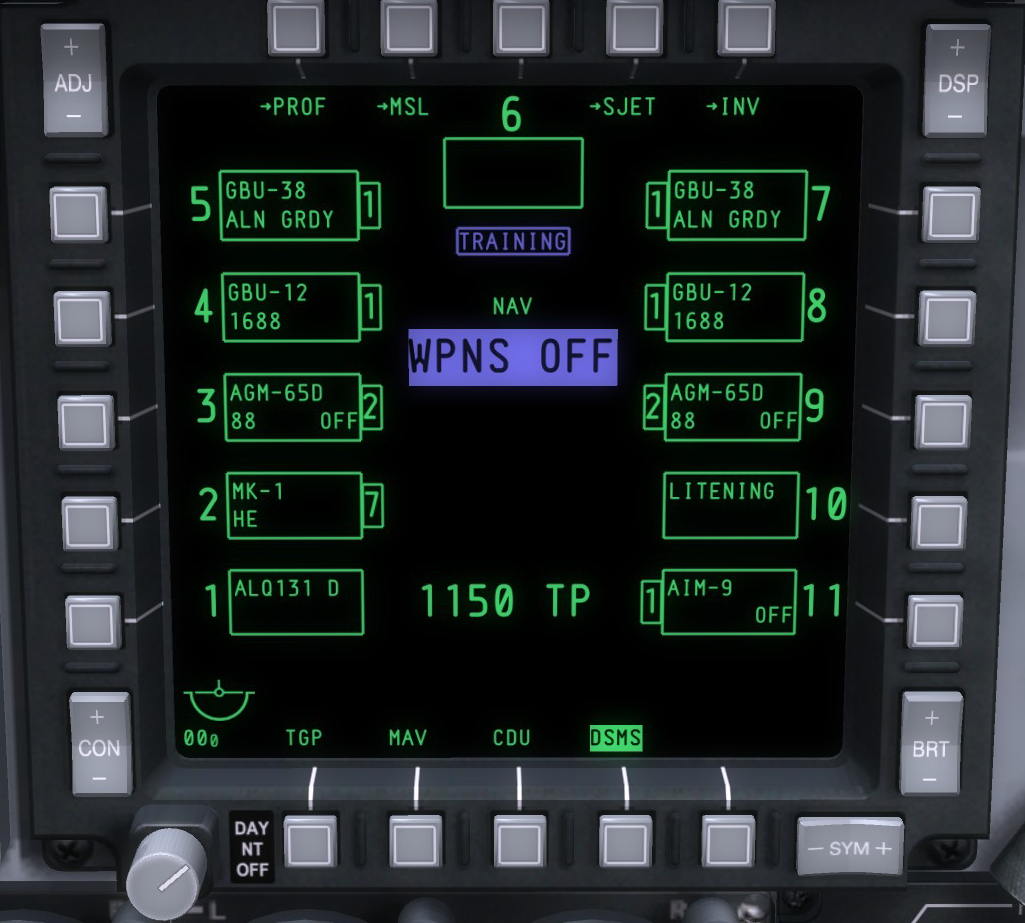
The DSMS replaces the A-10A Armament Control Panel (ACP) that was located on the front left panel. All weapon setting controls are now performed using the DSMS. Basic functions of the DSMS include the main Status page, selecting and editing weapon release profiles, inventory management, missile management (AGM-65 and AIM-9), and selective stores jettison.
The DSMS provides the pilot an overview of how the aircraft is loaded with stores, gun ammunition remaining, weapon status, the selected weapon profile, and release setting (SAFE, ARMED, TRAIN).
The DSMS also contains a sub-page that gives the pilot the ability to browse profiles, sel ect and edit profiles and parameters for the use of weapons, set fuzing for each weapon profile, and set the interval and the number of weapons in ripple release. Each of the combinations of these parameters is called a profile. These profiles can be selected either fr om the DSMS, the Up Front Control (UFC), or using the HOTAS.
The DSMS provides the ability to selectively reset the loading on any pylon or rail when in TRAIN mode.
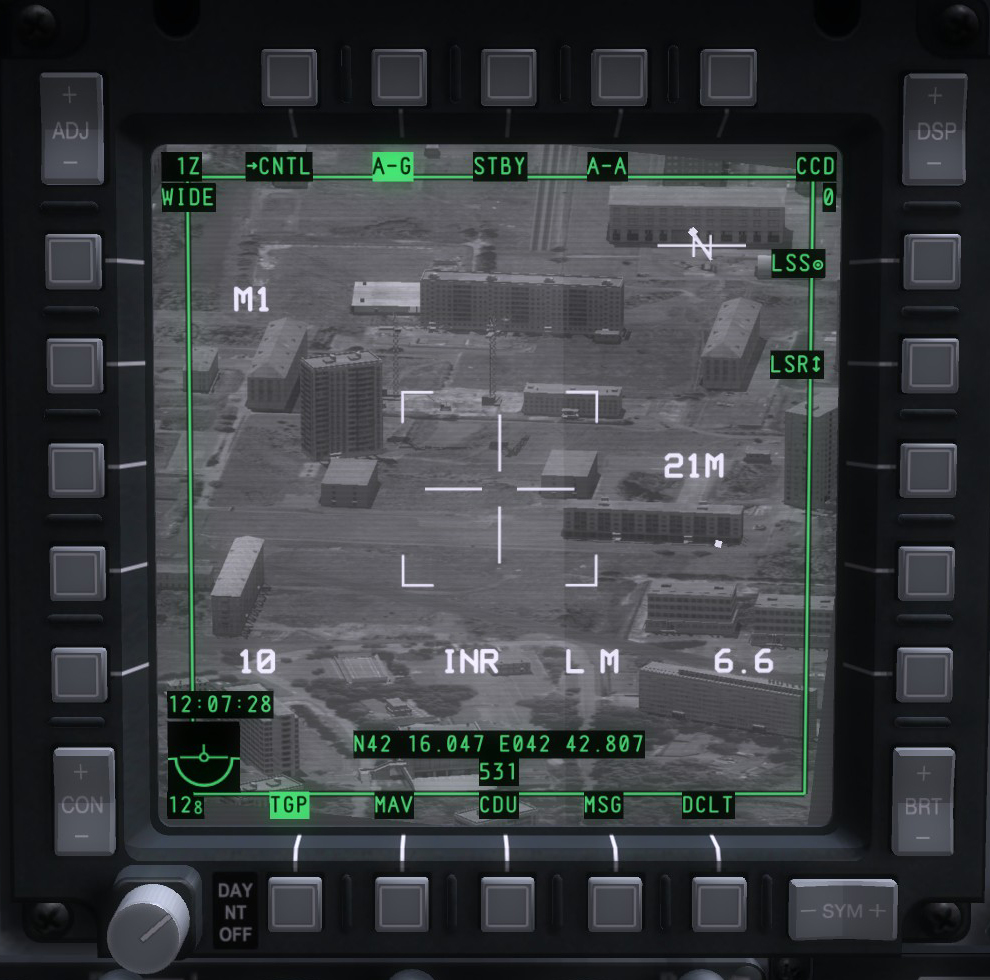
The Litening II AT targeting pod allows the pilot to detect, identify, track, and engage targets day or night. The TGP has two camera modes: optical (from CCD) and infrared (FLIR) in white-hot and black-hot modes.
The main modes of TGP include "Air-Ground" (AG), "Air-Air" (AA) and "Standby" (STBY). Each of these modes has a corresponding Control (CNTL) page, making it possible to adjust functional parameters of the TGP. Thus, the TGP has 6 different MFCD pages.
The TGP has both Wide and Narrow field of views in addition to digital zoom. The tracking modes include INR (inertial), AREA, and POINT.
In addition to the camera functions, the TGP can also laser designate and detect and track a laser designation in Laser Spot Search (LSS) and Laser Spot Track (LST) modes.
When in Air-Air mode, the TGP can be used to lock onto another aircraft and automatically track it. You can also lock a target and skew the AIM-9 to the target.
The TGP can also have its line of sight slaved to the SPI. Conversely, you can use the TGP to create the SPI and slave other weapons and sensors to it.
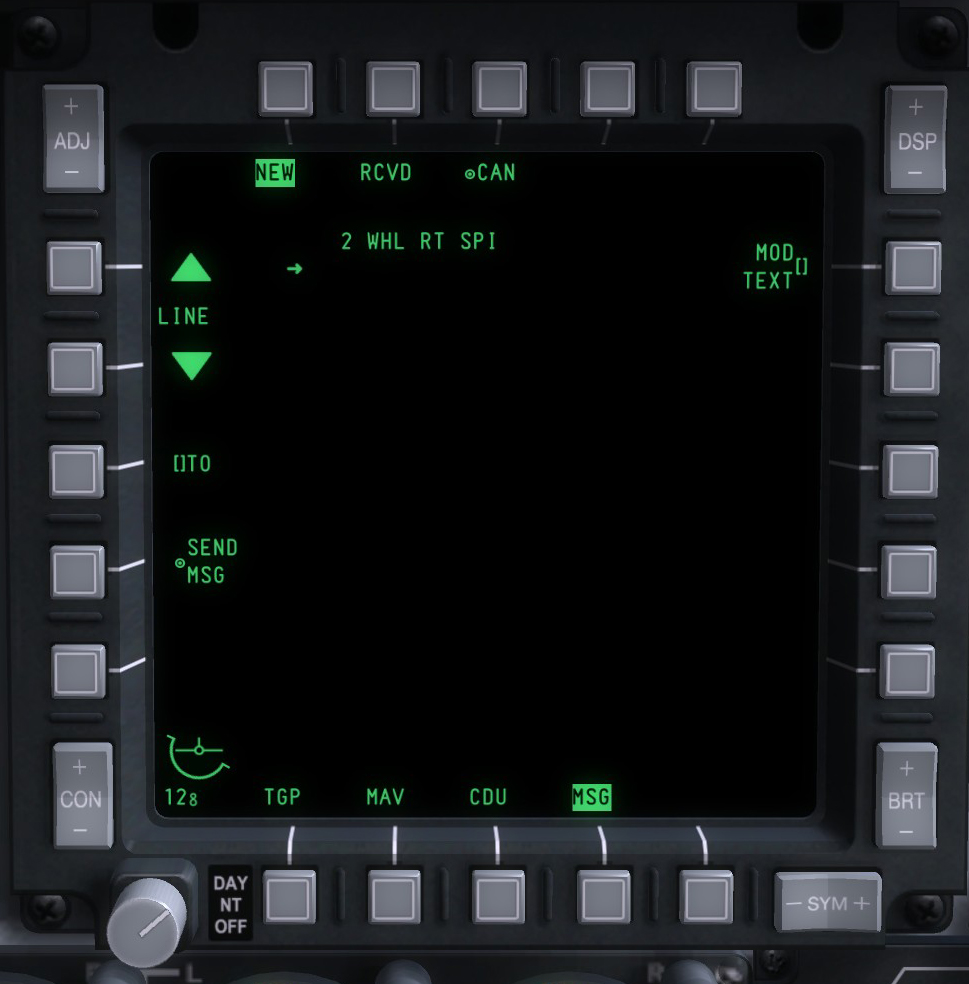
Using the SADL system, players can send and receive text messages between flight members.
The Message system is also used to received digital 9-line briefings from Joint Terminal Attack Controllers (JTAC).
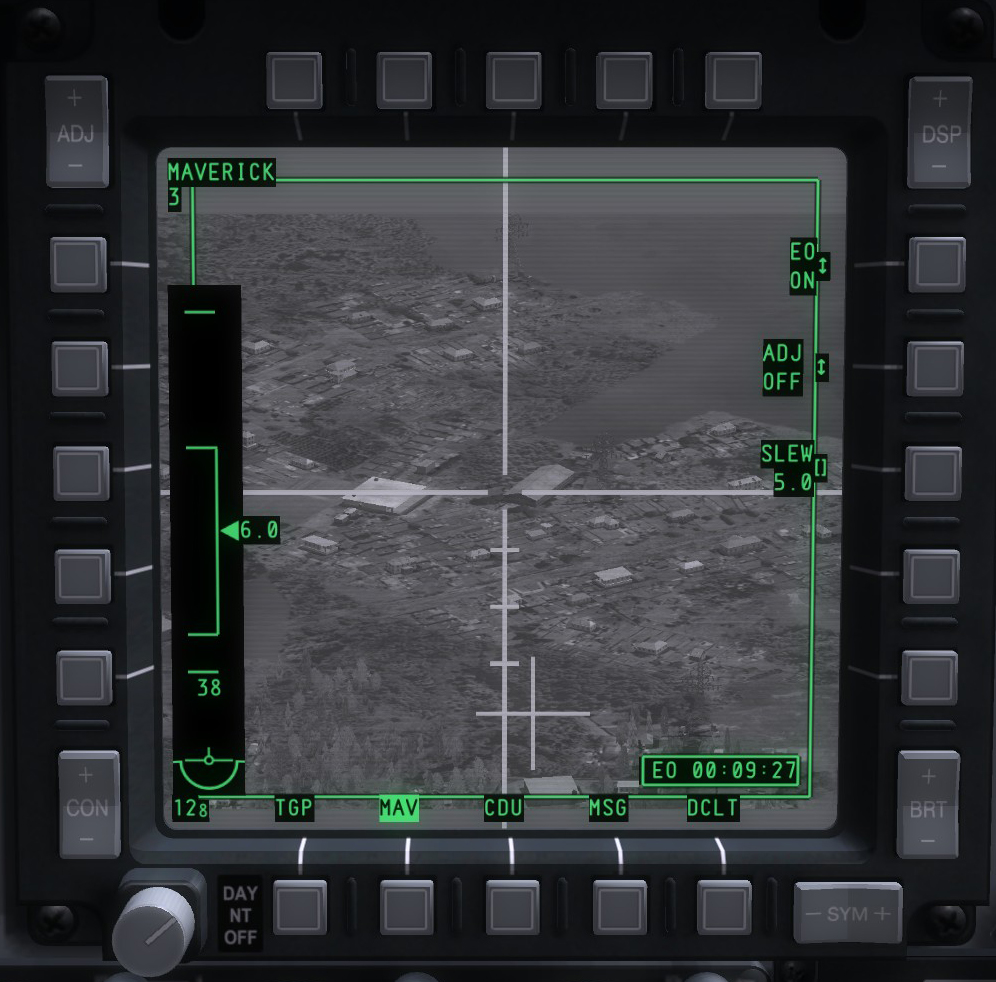
When a Maverick is loaded and selected for display on one of the MFCD, video from the seeker can be displayed either in SENSOR or WEAPON modes. Accurate Maverick functions for the A-10C are included: centroid track mode, force correlate track mode, break lock mode, boresight setting mode, slew rate adjustment, and tracking procedures.
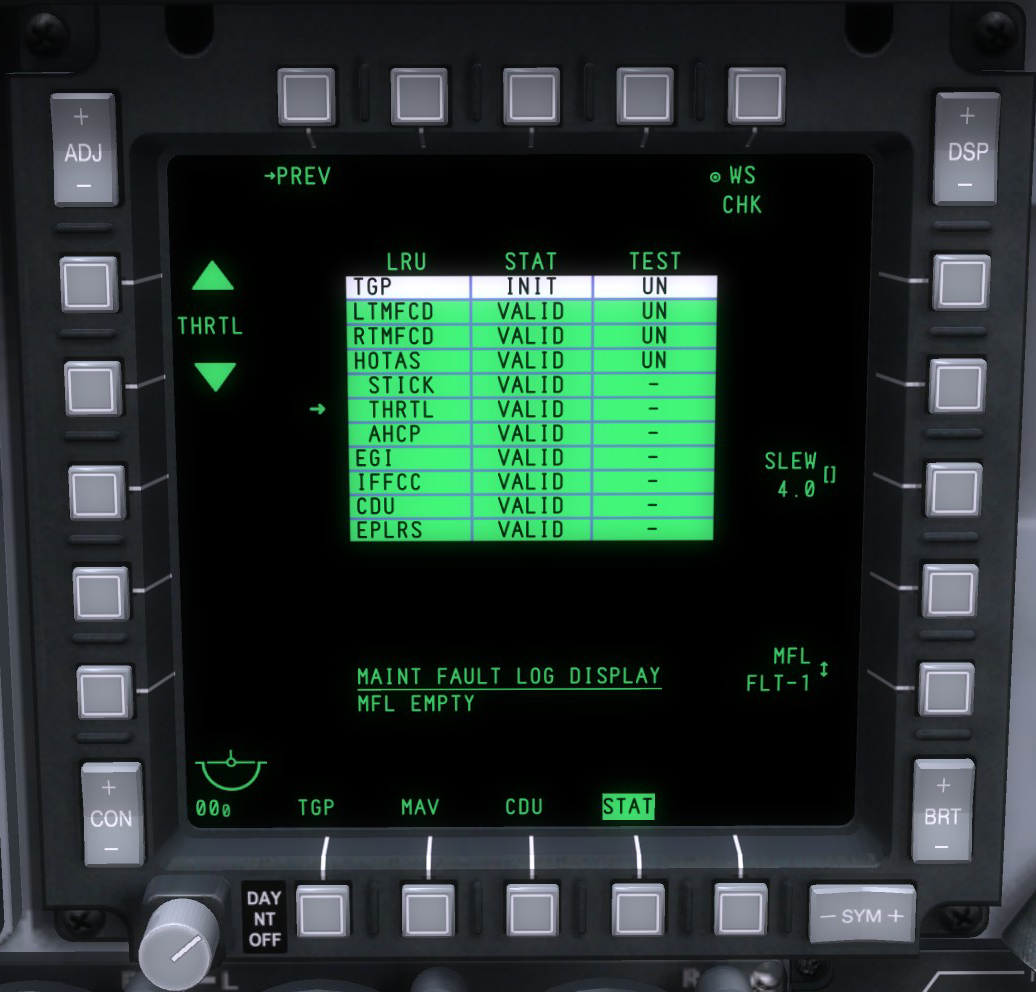
The STAT MFCD page allows the pilot to view the status of all stations and Line Replaceable Units (LRU). The STAT page is a useful page for diagnosing system problems. This page can also be used to adjust slew rates for the TDC/TAD/TGP cursor.

When a mission is created/edited in the Mission Editor/Mission Planner, the navigation and weapons data needs to be "virtually" loaded into the jet from a Data Transfer Cartridge when performing a ramp start. This MFCD page allows the pilot to select what data to load/re-load.
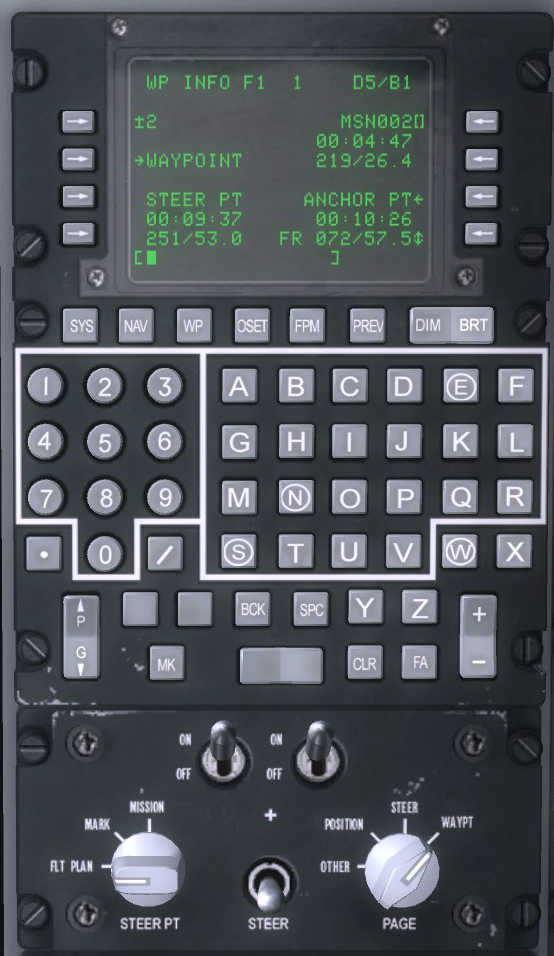
The EGI is the main navigation system of A-10C and it provides the ability to accurately determine coordinates (including altitude and spatial orientation) anywhere in the world. There are two main panels that are used to interface with the EGI: The Control Display Unit (CDU) and the Auxiliary Avionics Panel (AAP). Many of these panel functions can also be duplicated on the Up Front Controller (UFC) and MFCDs.
As a backup to the EGI, the HARS navigation system is also modeled.
The CDU is located on the right console above the AAP and consists of a display widow, six Function Select Keys (FSK), Line Select Keys (LSK) on either side of the display, an alphanumeric keyboard, and several other switches and buttons.
APP is also located below the CDU and is used to control power to the CDU and EGI. It also consists of a switch and two rotaries.
Working with EGI is based on a set of 2,077 waypoints loaded into the CDU. This database is usually created in advance in the Mission Editor, but can be edited while in-flight. Using the EGI CDU the pilot can create and edit flight plans, create new waypoints, set up navigation parameters, set divert airfields, create mark points, etc.
Other A-10C navigation systems included are TACAN and ILS.
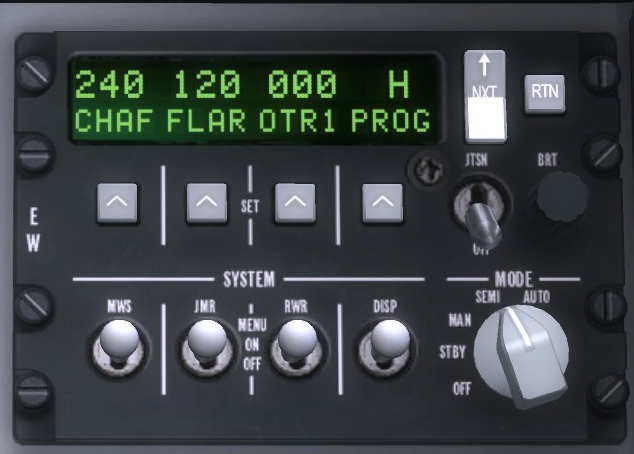
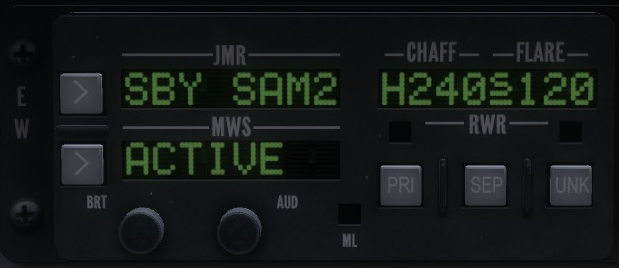
Although first introduced in late-model A-10A jets, the CMS provides the pilot with much greater countermeasure flexibility, to include:
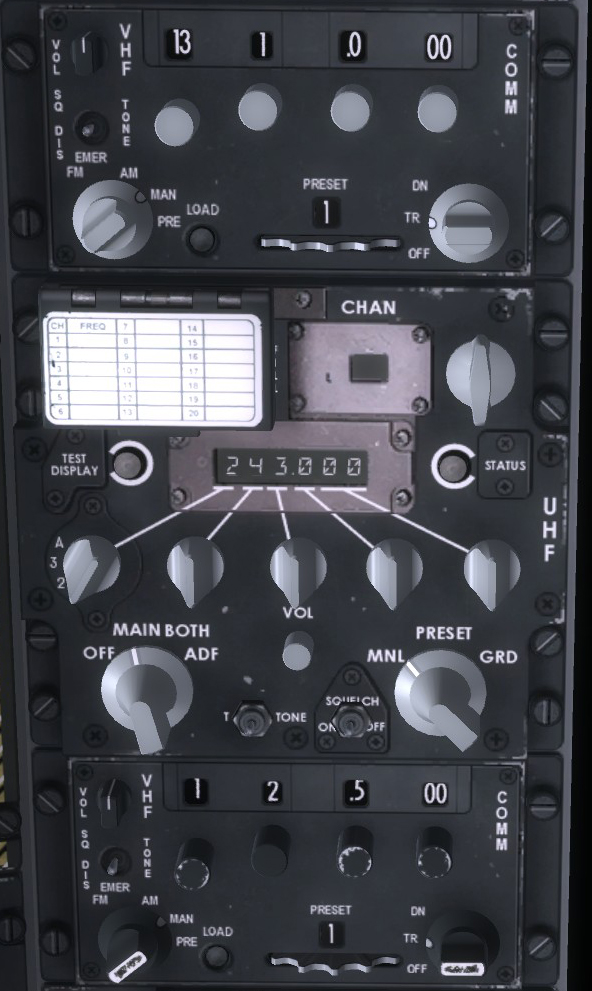
The A-10C uses three radios: one UHF radio, one VHF AM radio, and one VHF FM radio. Each of these radios is interactive needs to be set accordingly to communicate with other aircraft and ground elements in the mission (manual and preset frequencies). Each friendly aircraft is assigned a frequency that a radio must be tuned to in order to communicate with it. This is also true for the JTAC. When viewing the radio message window, the frequency of recipients is listed.
The HOTAS Mic switch can be used to select each radio and only the possible recipients on the modulation and frequency will be listed in the radio dialog menu.
Just like the A-10A, the A-10C uses a hydraulic-assisted flight control system. This system is modeled in detail in this simulation, as are the back-up direct linkage and using the electrical driven trim tabs (emergency modes). Manual Reversion, the Stability Augmentation System, Low Altitude Auto Pilot (LAAP), Enhanced Attitude Control (EAC), and the emergency flight control panel are included.

The GAU-8/A 30mm cannon can be loaded with three types of ammunition:

To further improve the visuals of DCS, we've added several new features that include:
Black Sea Map. The Black Sea map has been expanded eastwards further into Georgia and now includes the flashpoints of the areas around Tbilisi and South Ossetia. Parts of southern Russia have also been expanded (Mozdok) and the expanded map includes several new airfields and several updated ones with greater detail.
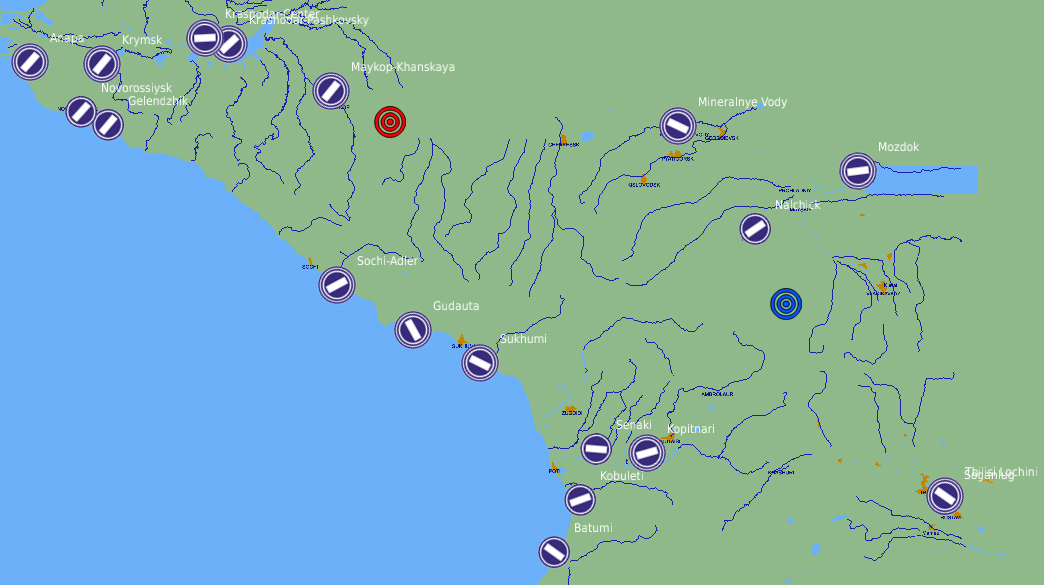
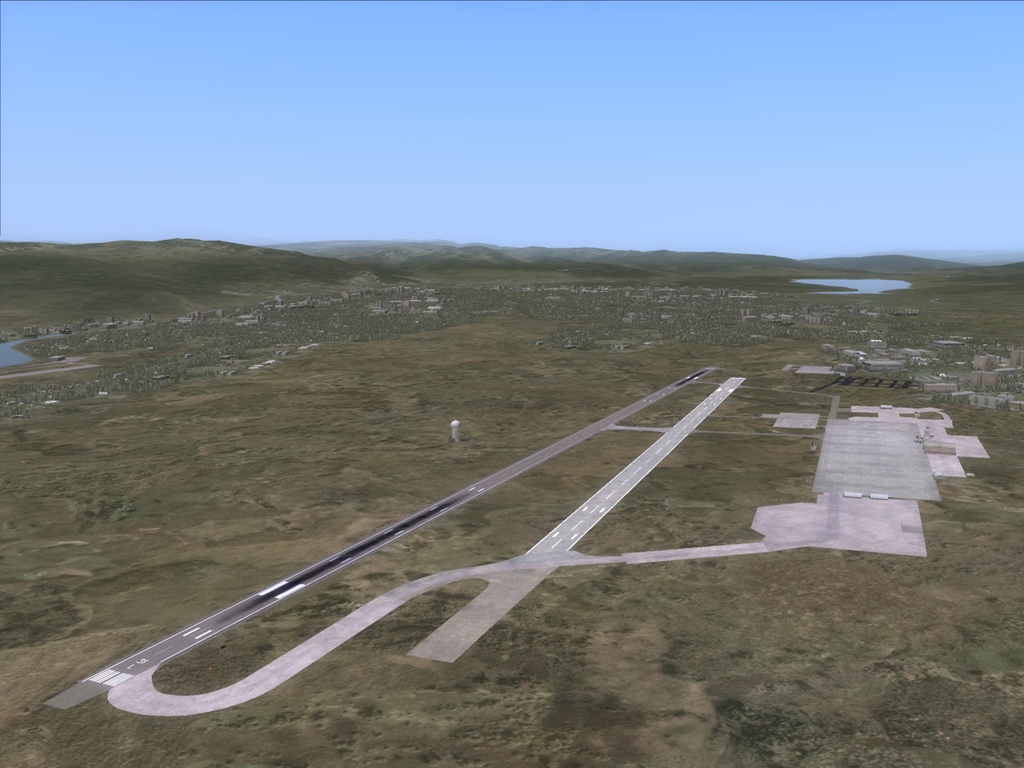
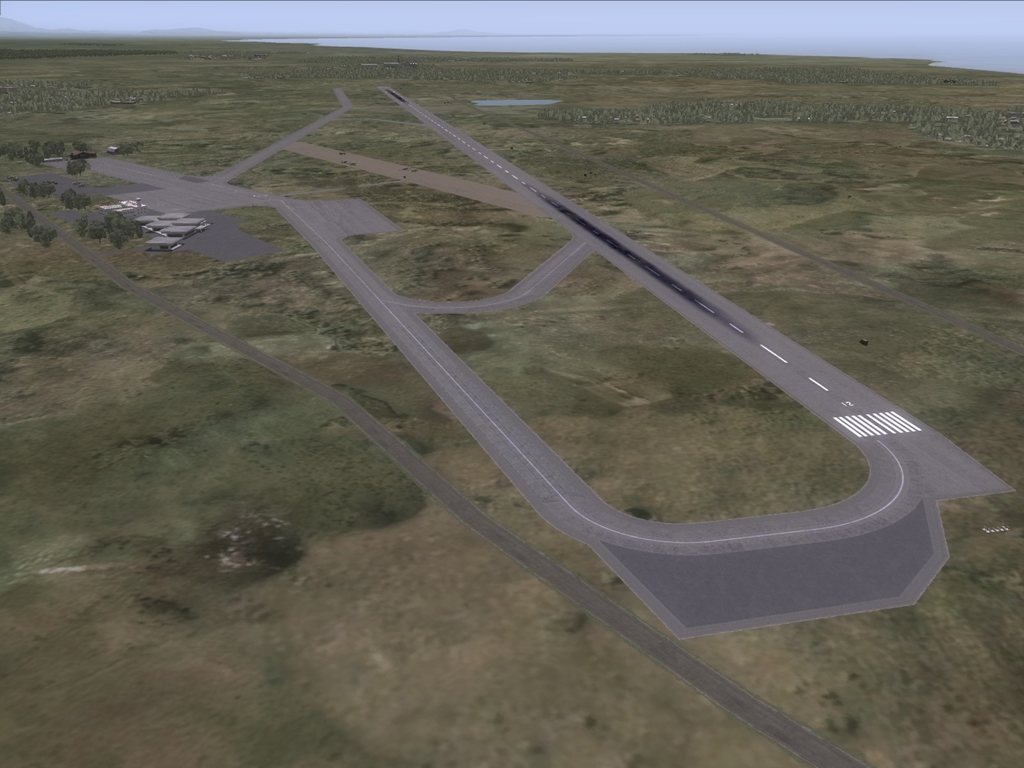
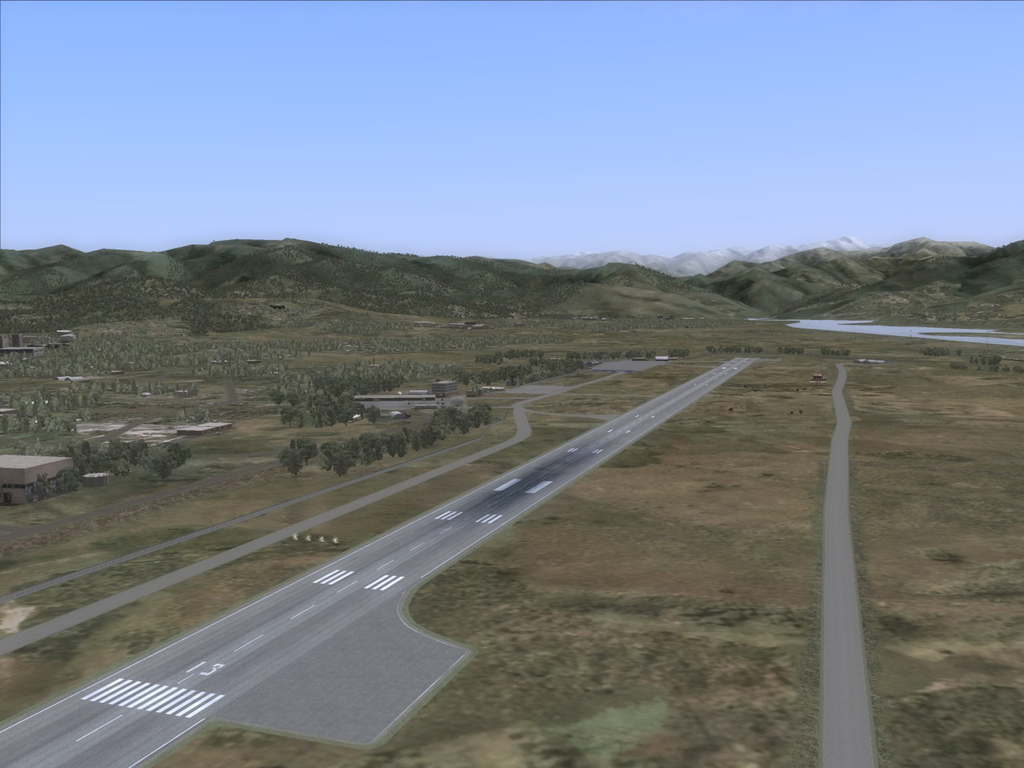
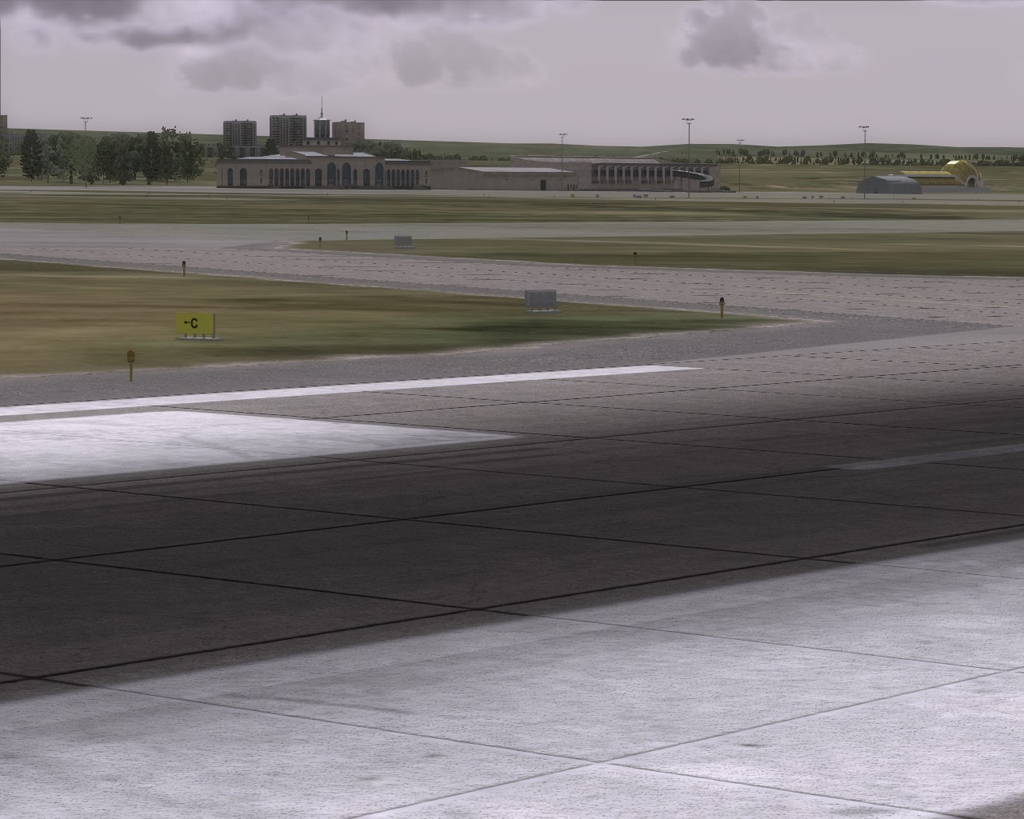
As the DCS series grows, we've added several new and improved AI-controlled units that include:
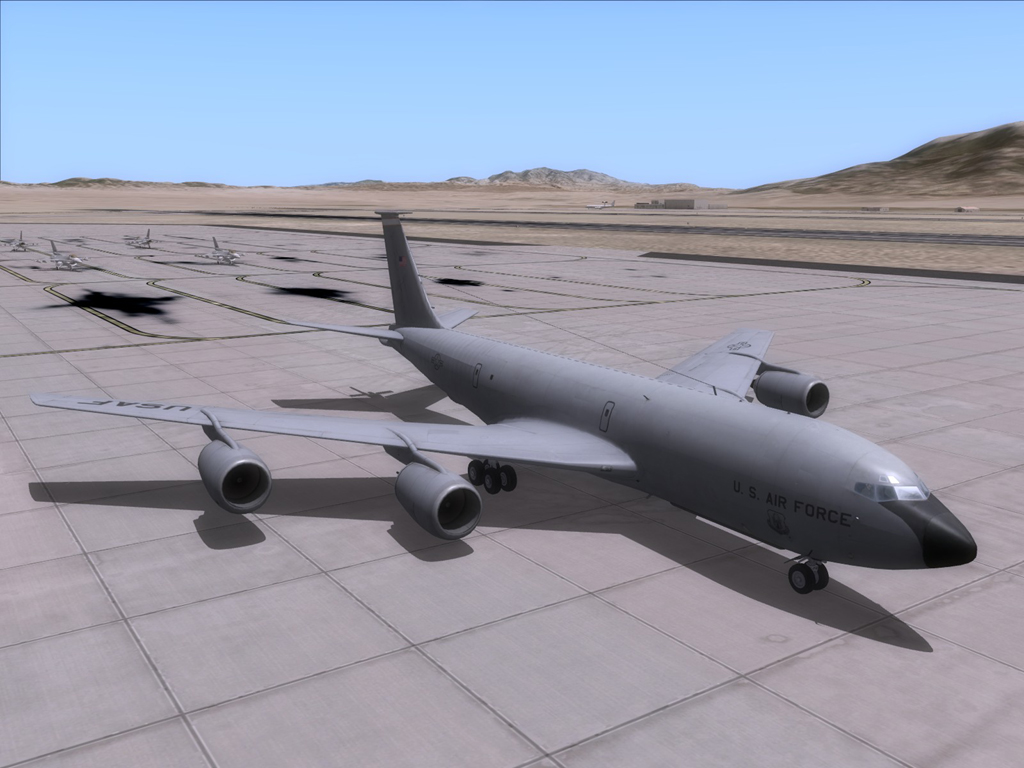
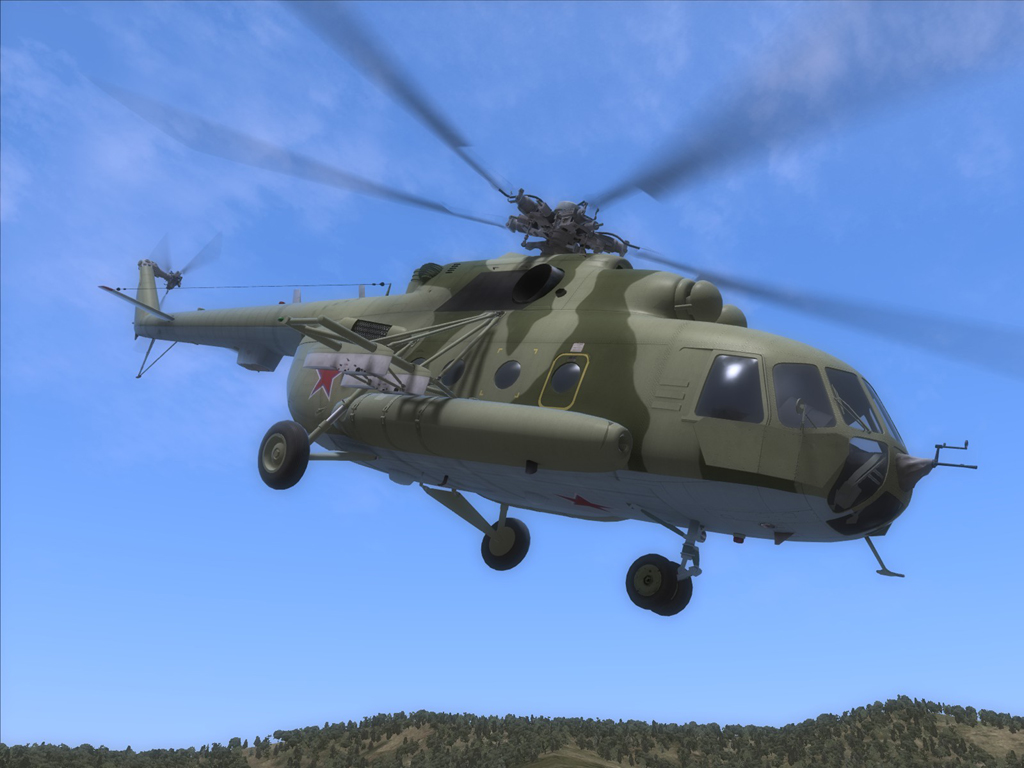
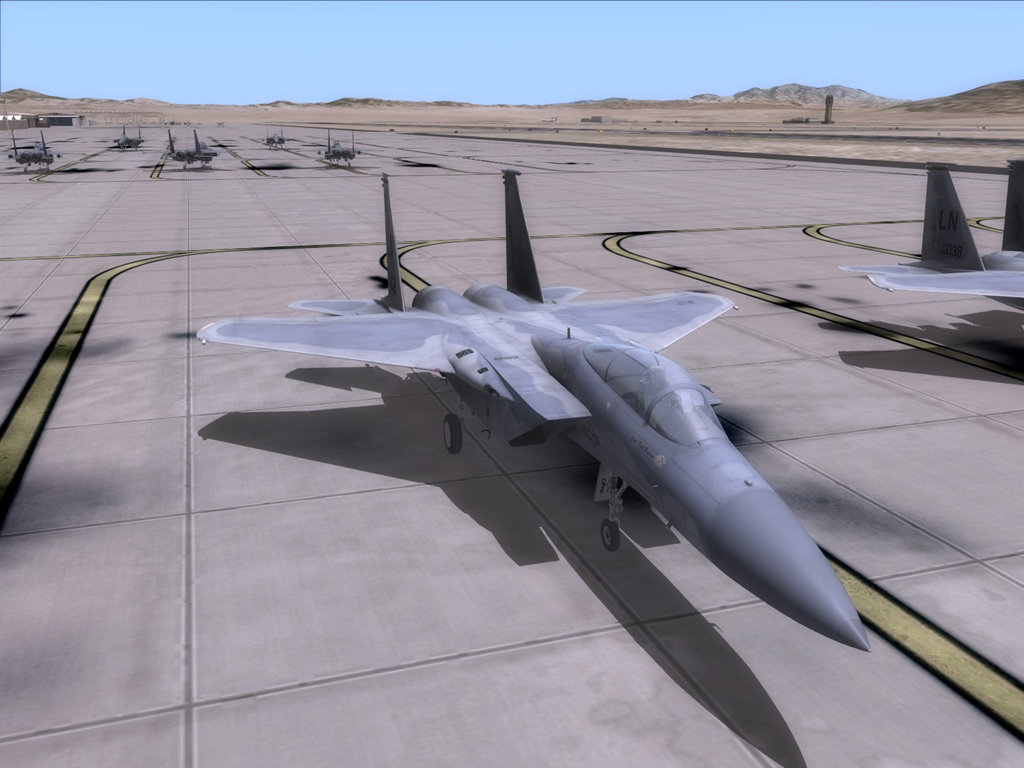
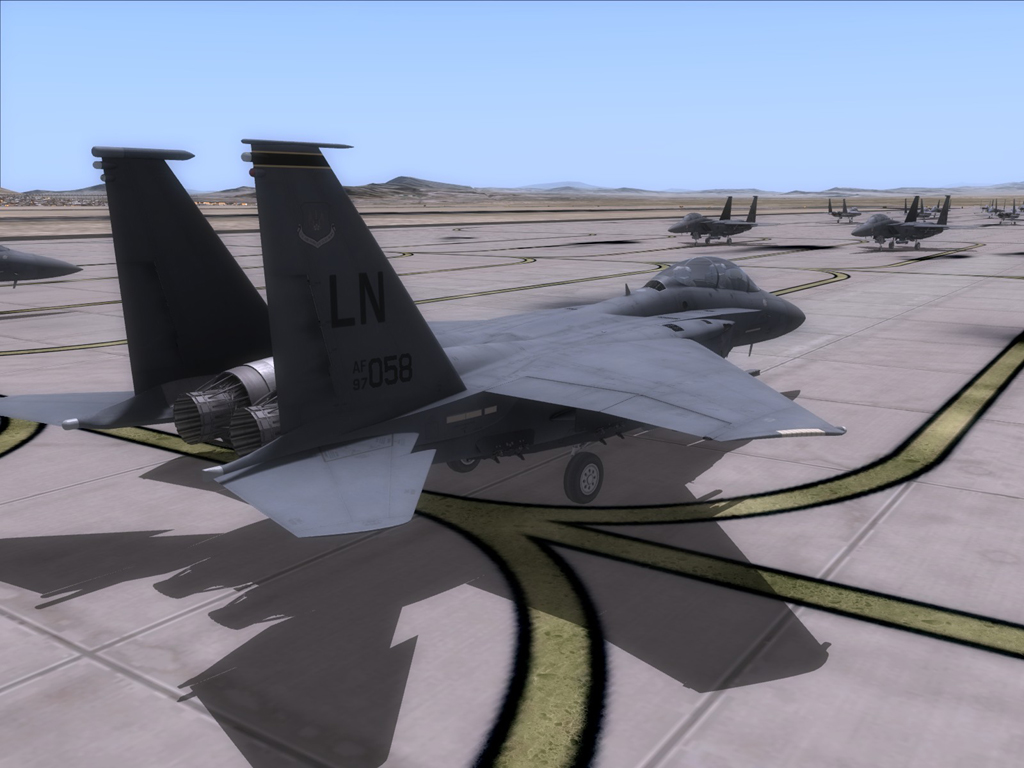
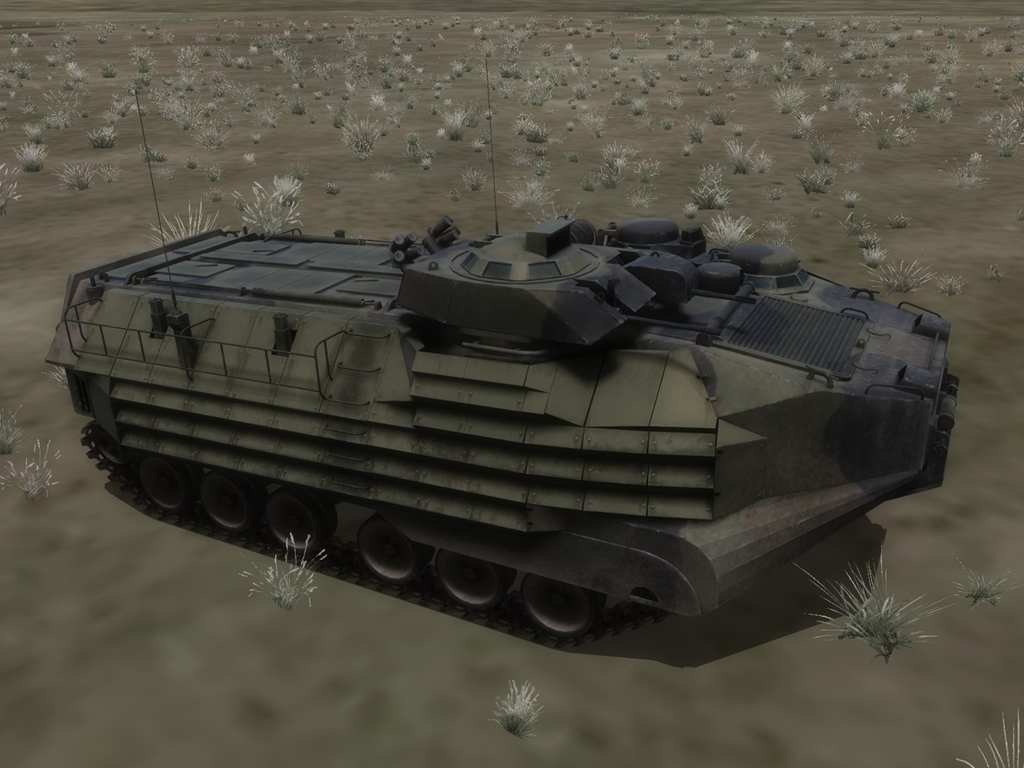
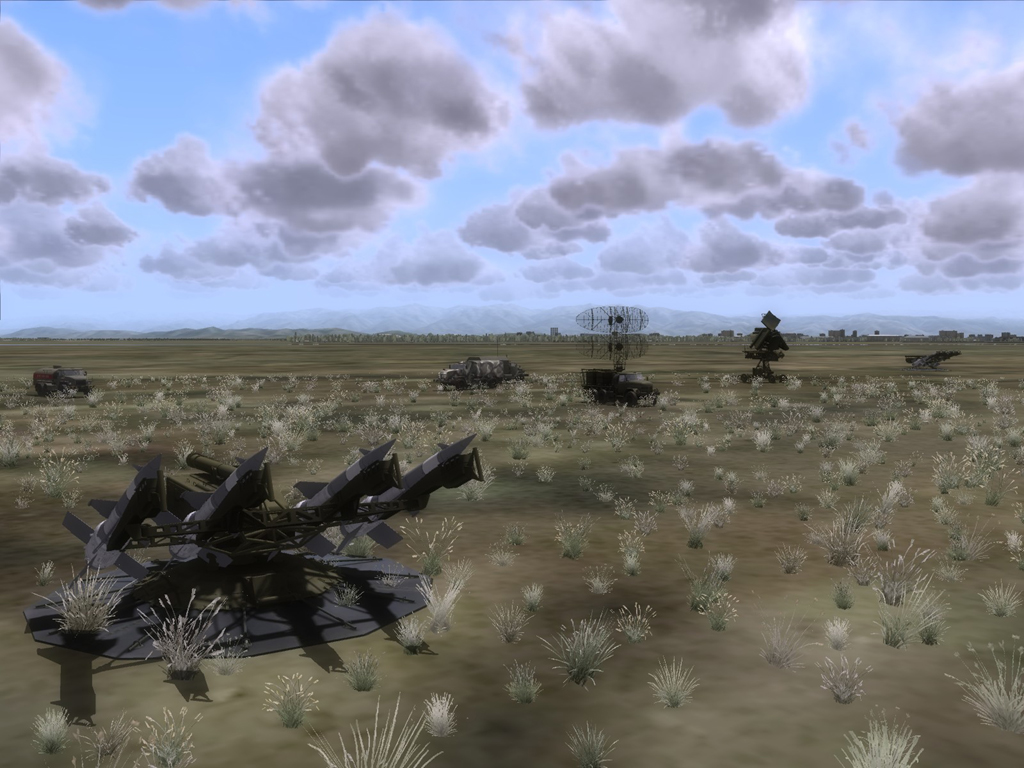
With the increased workload of the A-10C cockpit (targeting pod, tactical awareness display, programming DSMS weapon profiles, radio management, etc.), it can be a bit overwhelming at times when first learning the systems. For players that wish to use it, the Active Pause option is now available that halts action during the mission but allows the player to use the various A-10C systems.
The Mission Generator (MG) is a new feature to the DCS series that allows players to generate a mission with a single click of the mouse. The MG is based on combination of 100 locations around the Black Sea map that can be populated with a series of various force templates with multiple variables that ensure a massive number of possible missions and replayability.
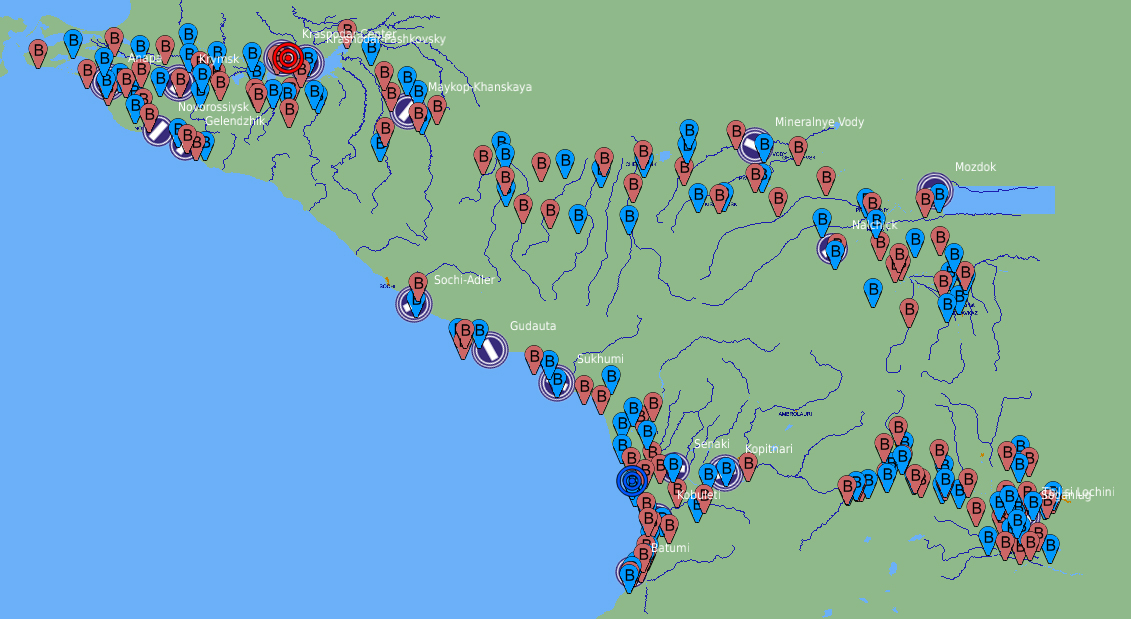
For those that want to tune the missions, options to sel ect difficulty, season, weather, time, size of forces can be set fr om the MG window.
Users can also use the MG system to create their own battle locations nodes and force templates.
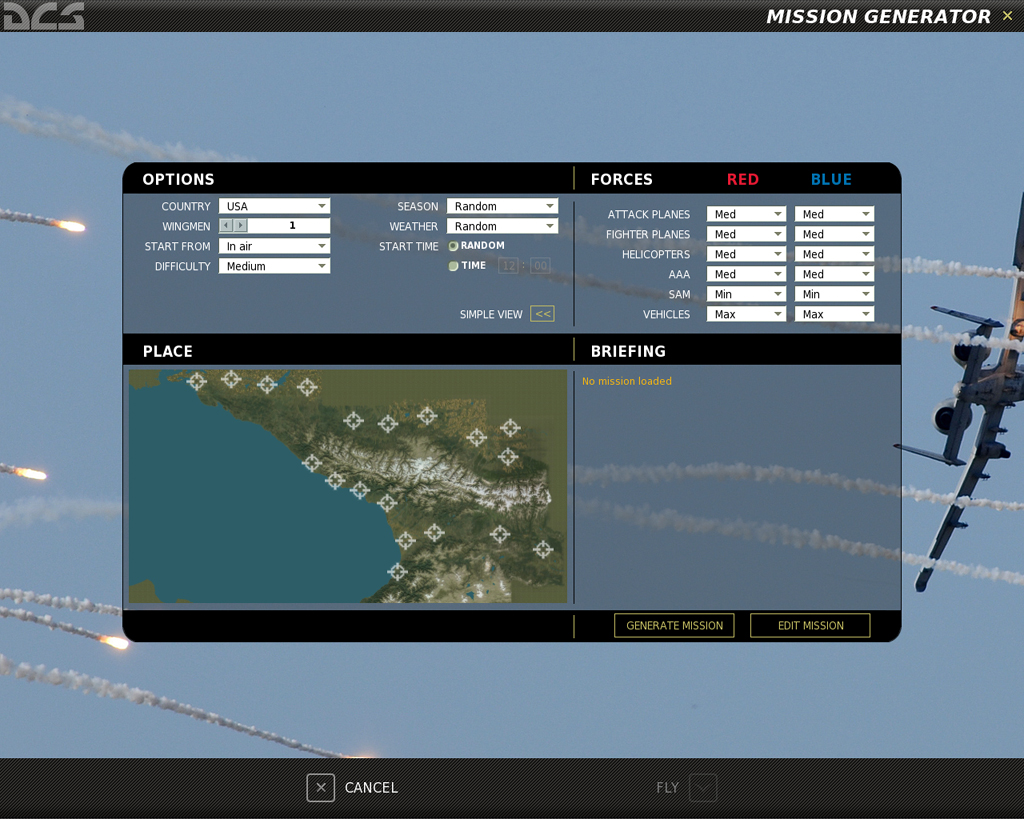
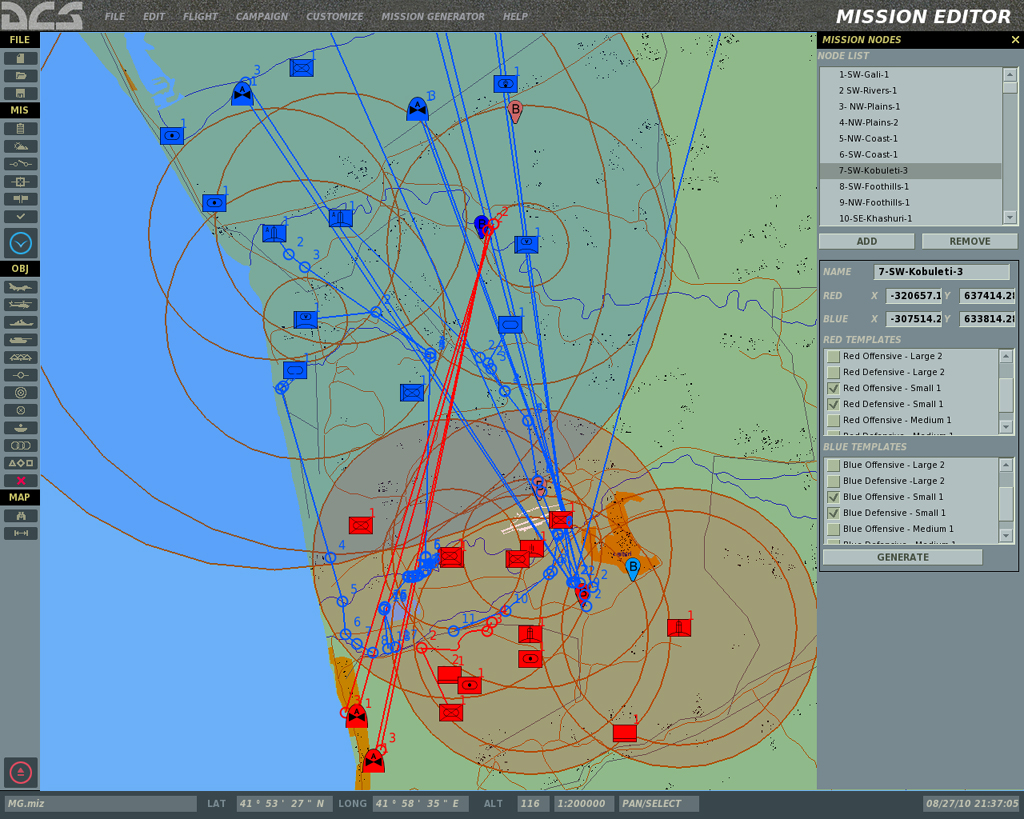
A-10C includes two campaigns in the Black Sea combat theater that take advantage of the many new Mission Editor features like commanding friendly air and ground groups. You will also see such functions as commanding other AI air groups to break orbits and attack and sending "Go Codes" to ground forces to advance.
A critical part of the A-10C Close Air Support (CAS) mission is working with a Joint Terminal Attack Controller (JTAC) to help detect and attack enemy ground forces. A-10C includes the most detailed and realistic virtual JTAC ever created for the desk top.

Depending on the JTAC location to enemy forces and the time of day, JTAC target designation can be by sending UTM coordinates, laser designation, mortar smoke marker, or IR pointer.
In addition to tasking instructions over the radio, a digital tasking can also be requested as a text message and target location on the TAD moving map.
Given the A-10C's mission, ground forces artificial intelligence is critical. Important improvements include:
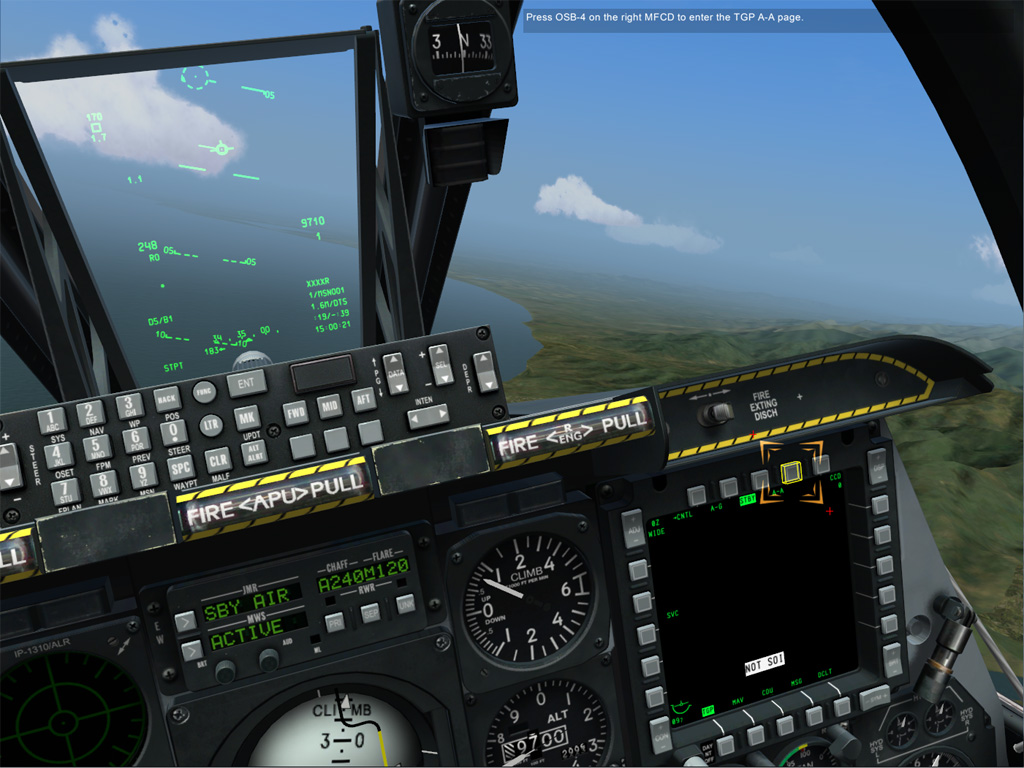
Particularly with such a detailed simulation as "DCS: A-10C Warthog", a step-by-step, interactive training system makes the job of learning to fly the aircraft monumentally easier.
The A-10C training system uses a combination of icons, voice messages and sub-titles to walk the player through each training mission. At each step of the mission, the instructor requests the player to perform an action, and not until the action is done, will the instructor move on to the next task. A graphic highlight is used to point out to the player specific cockpit switches to manipulate to progress to the following step.
The A-10C training module features a syllabus of lessons to progress the player from a general introduction to the A-10C trough a series of lessons in systems management and weapons employment.








